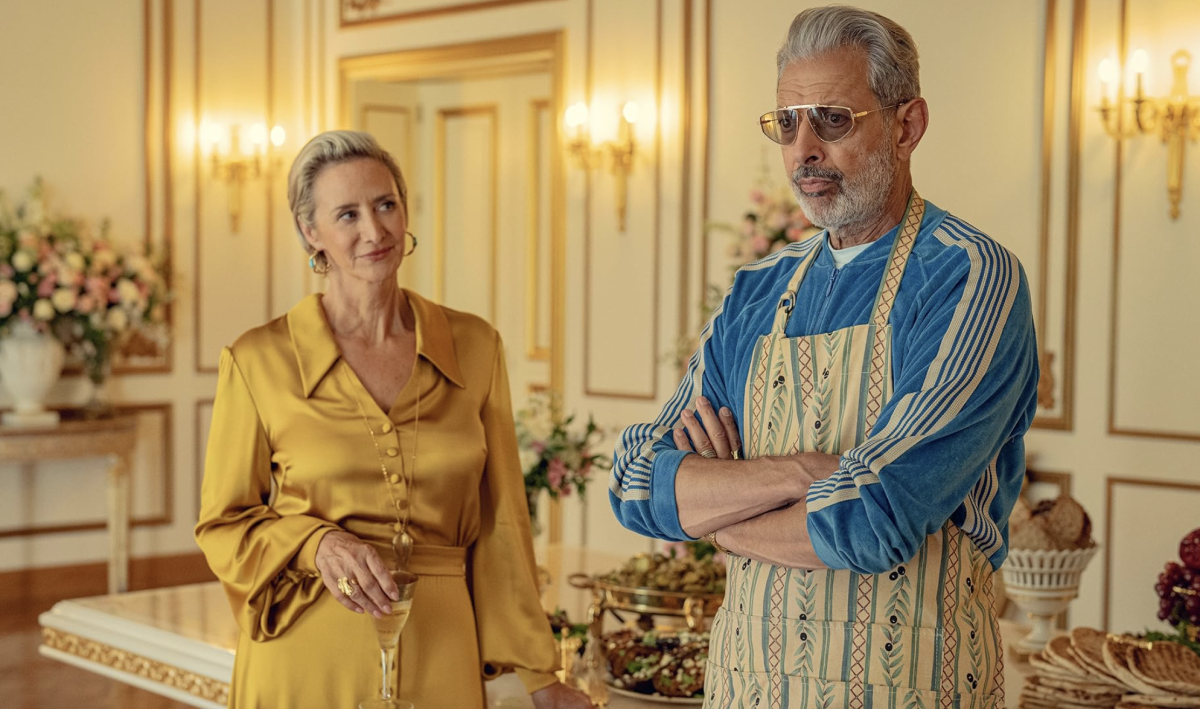
As an enthusiastic reader of Greek and Roman mythology, I had never once imagined Zeus with an immaculate taste in tracksuits. Or as Jeff Goldblum. “Kaos,” a new TV series created by Charlie Covell, brings the ancient Greek gods and their stories to the modern era as it weaves its own distinct myth of grand power, betrayal and love.
“Kaos” centers on the unraveling of an ancient prophecy, seemingly declaring the end to the gods’ rule, that leads to an ever-more fearful Zeus (Jeff Goldblum) racing against fate to stop the threat to his legacy. His obsession with this prophecy slowly seeps its way through the family around him as his wife and sister Hera (Janet McTeer) and brother Poseidon (Cliff Curtis) attempt to dispel his worries while his son Dionysus (Nabhaan Rizwan) begins to realize his purpose beyond the family. Despite Zeus’ efforts, the prophecy begins to grow, becoming a connecting force to three humans, Eurydice, or Riddy for short, (Aurora Perrineau), Caeneus (Misia Butler) and Ari (Leila Farzad), whose lives begin to come apart to reveal their true destinies.
The greatest strength to “Kaos” is its inventive writing as it transforms the ancient universe of its source material into a tangible modern landscape. The various myths that are chosen to drive the storylines within the show are given new life with small changes that give a novel take to these classic stories. A particular highlight is the adaptation of Orpheus and Eurydice. In the show’s universe, Orpheus (Killian Scott) is a rising singer-songwriter whose love for wife and muse Eurydice drives much of the passion he feels in life. However, Eurydice, known as Riddy, feels suffocated by the love Orpheus has given her and feels purposeless in their marriage, which she views as more so a cage than a dream come true.
The most famous part to the story of Orpheus and Eurydice is its ending – Orpheus, despite all his efforts to bring Eurydice back from the Underworld, loses everything when he breaks the single rule given to him by Hades: never to look back until they were in the mortal realm. The writing takes this ending in a different direction. Here, Eurydice succeeds in returning to the mortal world with Orpheus, but Orpheus finds out that Riddy has fallen out of love with him. In their final goodbye, instead of Orpheus turning his back to Eurydice, Riddy begs Orpheus to look back at her for one last time, which Orpheus does, honoring their past love before they leave one another. This creates a different sort of tragic romance that honors the original myth while giving an interesting spin to its story.
However, some pieces of storytelling seem to rely too much on the audience’s preexisting knowledge of these myths. This pitfall appears in the development of Theseus and Ariadne, who are love interests in the myth of the Minotaur. The show establishes a similar romantic entanglement between them, but more so in words than actual action, to the point that it fails to create a believable connection. Furthermore, certain relationships aren’t given the adequate time to grow, as seen in the romance between Riddy and Caeneus. During the entirety of the story, the two are not given room to breathe, with the directors relying solely on the narrative of love at first sight between the pair. While the chemistry between the actors is there, it isn’t enough to drive this narrative of an instant connection with the few short conversations that had been written between them.
Beyond adaptation in story, the cast of gods and mortals are also adapted into quite dynamic characters. One of these interesting adaptations is Dionysus. Introduced as the god of pleasure, madness and wild frenzy, there appears to be no bite beneath his often gullible and naive exterior as he principally seeks approval from his father, Zeus. Contrasted against the general apathy towards humanity that Zeus, Hera and Poseidon hold, Dionysus is shown with a quiet love for mortals that grows into a defiance for the role set out for him as one of the gods. As he moves throughout the narrative, Dionysus evolves distinctly from his initial naiveté and meekness into a force of his own right.
The ensemble cast in “Kaos” further elevates the already dynamic set of characters of the show. Goldblum absolutely shines as the crazed, unpredictable king of the gods, expertly managing Zeus’ morbid comedic nature which hides a terrible cruelty underneath the mask of a bored billionaire. Additionally, McTeer excels as Hera, delivering a vicious performance that weaves in Hera’s hidden turmoil of emotions with the unshaken, bold nature to her character. Next to Goldblum and McTeer, Rizwan effectively brings a contrast to the chaos of this dysfunctional family as he adds a softer, often sweeter edge within the bountiful energy he gives to Dionysus.
With its first season, “Kaos” forms a unique identity for itself with its inspired storytelling and complex ensemble of characters, delivering both delightful moments of twisted fun and emotional tides as the gods and mortals are brought closer to their fates. It’s only within the small power that is a viewer’s hope that “Kaos” can return to finish its story. As of now, we’re left with a modern myth detailing the lust and paranoia in power, the strength of love and the desire to defy fate.




















